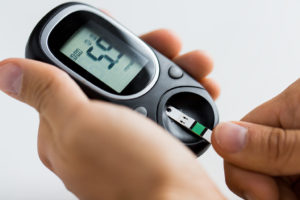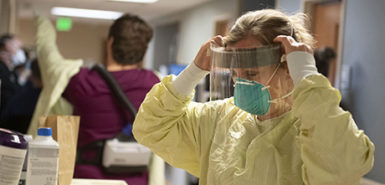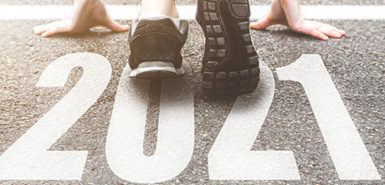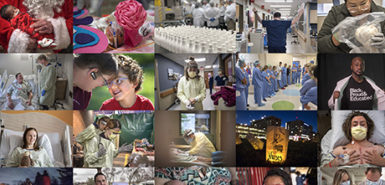
If you have diabetes, the stakes are high in this COVID-19 pandemic.
Having diabetes puts you at greater risk of severe illness, complications and long hospital stays.
“It is a difficult virus. It’s not like anything else we have ever had before,” said Gregory Deines, DO, a Spectrum Health diabetes expert. “It is not the flu—this is worse.”
However, there are steps you can take to reduce your risks—in case you contract COVID-19.
Be aware of your risks
“People with diabetes are not necessarily more likely to get infected with COVID-19 than anybody else,” Dr. Deines said. “The problem is that if they do get infected, their disease seems to be worse.”
And those who have diabetes plus complicating conditions, such as heart disease or obesity, tend to have more severe illness and poorer outcomes.
In general, having diabetes can make any serious infection more challenging.
“Your body has a stress response to that illness. That can cause your blood sugar levels to go up. It can cause your insulin requirements to go up,” Dr. Deines said. “This particular virus seems to have a magnified effect.”
Doctors are investigating why that is the case, Dr. Deines said. Much is still unknown about the virus, which was identified just a year ago.
Researchers also are studying whether the virus has different effects on Type 1 and Type 2 diabetes—once known as juvenile and adult-onset diabetes.
“What we know is generally, if you have either Type 1 or Type 2 diabetes, the illness you experience from the virus is more severe than for people who don’t have diabetes,” he said.
Diabetes educators at Spectrum Health help patients find ways to minimize their risks, said Amy Robinson-DeFouw, a diabetes education supervisor at the Spectrum Health Center for Diabetes & Endocrinology.
“I think patients are nervous just because they know that, as they have chronic conditions, they are more at risk,” she said. “From an education perspective, we always want to make sure patients are well armed with information.”
Dr. Deines and Robinson-DeFouw shared tips that can boost your odds of successfully recovering from an illness.
Keep diabetes under control
Following the steps recommended to manage your diabetes can help reduce your risk of a more severe illness if you get COVID-19.
“If it’s under poor control, you can get much sicker much faster,” Dr. Deines said.
Eat a healthy diet, exercise, monitor your blood sugar regularly and take insulin or other medications as directed.
Stock up
Have enough medication and blood-sugar testing supplies on hand to last at least 14 days—or a month, if possible.
“We need to plan ahead, especially in these serious times,” Robinson-DeFouw said.
“If we get sick, we could be quarantined for 10 to 14 days. We might not be able to get out of the house (to pick up supplies).”
Robinson-DeFouw also recommends creating a “sick day plan.”
If you are fatigued, feverish and experiencing muscle aches, you may not feel like eating or drinking much.
Stock up on simple foods, like toast and crackers, that you can eat when you are sick. Prepare some healthy meals and put them in the freezer, and keep easily prepared foods, like soup, in the pantry.
Keep some simple carbohydrates on hand— like sweetened drinks, pudding and popsicles—that you can eat to raise your blood sugar level, if needed.
Get vaccinated
Do your best to avoid a double whammy—influenza and COVID-19.
“The simplest thing anyone can do right now is to get the flu vaccine,” Dr. Deines said. “And if you have diabetes, you absolutely need to get your flu vaccine.”
And when it becomes available for you, get the COVID-19 vaccine, he urged.
If you get COVID-19
Call your primary provider if you experience symptoms of COVID-19, Dr. Deines said.
The warning signs include:
- Fever
- Dry cough
- Shortness of breath
- Chills, and repeated shaking with chills
- Muscle pain
- Sore throat
- Loss of sense of smell or taste
If you are sick, it’s important to remember to continue taking your medication, Robinson-DeFouw said.
“And if you don’t feel like eating, ensure you are getting some kind of carbohydrates,” she said.
She suggested trying these foods, which each contain 15 grams of carbohydrates:
- Six soda crackers
- A piece of toast
- One cup of cream or broth-based soup
- 1/4 cup sherbet
- 1/2 cup regular custard
- 1/2 cup sugar free or 1/4 cup regular pudding
- 1/2 cup ice cream
If you have an upset stomach or diarrhea, Robinson-DeFouw suggested trying clear liquids, which can contain 15 grams of carbohydrates. Sip a little at a time:
- 1 cup (8 ounces) Gatorade
- 1/2 cup (4 ounces) regular soda pop (not diet). Stir to remove bubbles if vomiting
Seek medical help immediately if you experience any signs of a medical emergency. They include:
- Shortness of breath or difficulty breathing
- Persistent pain or pressure in your chest
- New confusion or changes in levels of alertness
- Bluish lips or face
- If a person can’t be awakened or cannot stay awake
“That’s when you need to call 911,” Dr. Deines said.
Mask up
Because of their heightened risk, those with diabetes should be vigilant about avoiding infection, Dr. Deines said.
“Wear a face mask. Wash your hands. Stay a least 6 feet away from everyone else,” he said.
And avoid places where people do not follow those public health guidelines.
For additional information and guidance, he encouraged patients to rely on trustworthy sources of information, including the American Diabetes Association and the Centers for Disease Control and Prevention.
The American College of Endocrinology has created a checklist, My Emergency Diabetes Plan, detailing the essential items to have available in case of emergency.
Anyone with diabetes should take seriously the risk of COVID-19, Dr. Deines said.
Your neighbor or friend might have a mild illness—or no symptoms—with COVID-19. But you may still be at risk of becoming very ill.
“I’ve personally seen the whole spectrum of illness,” he said. “I’ve seen patients with diabetes who have minimal to no symptoms (with COVID-19).
“I also know patients who have been in the hospital with this illness. And I know people who have died from this.
“This is a real public health emergency,” he said.

 /a>
/a>
 /a>
/a>
 /a>
/a>